Archives
-

Competing Narratives and Technological Pathways to Social Resilience in a Polarized World
Vol. 11 No. 1 (2026)Presentation
Volume 11, Number 1 (2026)Competing Narratives and Technological Pathways to Social Resilience in a Polarized World
The year 2026 marks a new cycle for Diversitas Journal, and Volume 11, Number 1 inaugurates this stage with a dossier that directly addresses the most urgent challenges of our time. Under the theme "Competing Narratives and Technological Pathways to Social Resilience in a Polarized World," we have gathered research that explores how discourses, emerging technologies, and sociopolitical dynamics shape—and strain—collective life.
With this dossier, we reaffirm our commitment to critical, pluralistic, and interdisciplinary scientific production, inviting readers to reflect on the challenges and possibilities of building more cooperative and sustainable futures.
Cover: Photograph by João Vinicius dos Reis Title: The rhythm of the city does not prevent education from flourishing alongside nature Location: Arapiraca, Alagoas, Brazil
Designer: Mateus Bispo -

Reimagining higher education for a sustainable future: the Philippine transformation in the global context
Vol. 10 No. Special_3 (2025)Reimagining higher education for a sustainable future: the Philippine transformation in the global context.
This edition is a co-production of the
State University of Alagoas, Brazil,
Asia Pacific Consortium of Researchers and Educators, INC.,
CEBU Normal UniversityCoordinator
Racidon P. Bernarte - Asia Pacific Consortium of Researchers and Educators, INC.
Mariae Khrisna B. Arreza, PhD - Cebu Normal University:
OIC-Dean, College of Tourism, Hospitality, and Hotel ManagementEditorial: Prof. Dr. Angelito Bautista. Quezon City University, Philippines.
Editor-in-Chief: Dr. José Crisólogo. State University of Alagoas, Brazil.Cover: Mateus Henrique Bispo
-
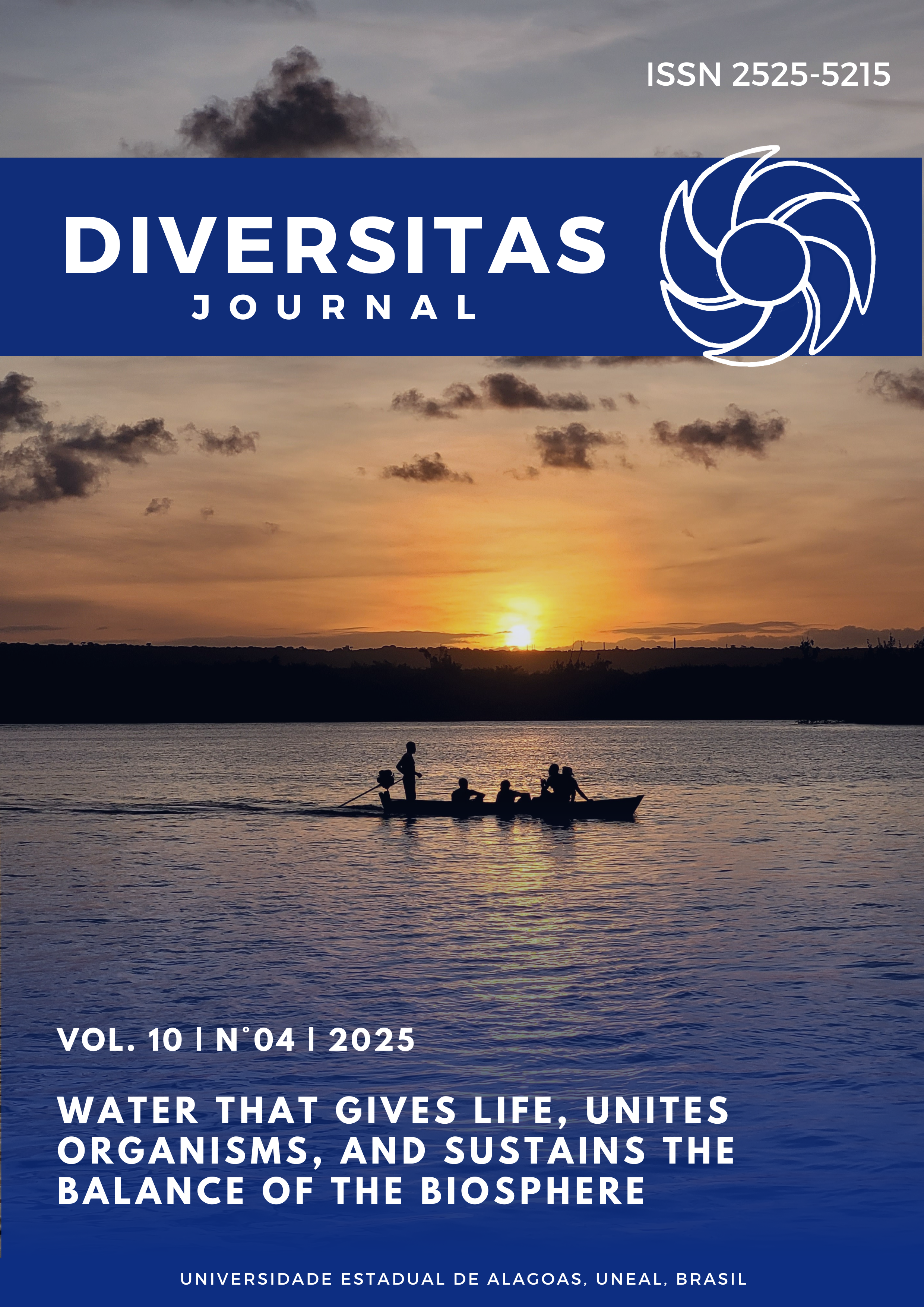
Water that gives life, unites organisms, and sustains the balance of the biosphere
Vol. 10 No. 4 (2025)Water: source of life, link between organisms, and guardian of the biosphere's balance
Issue 4 of Volume 10 of Diversitas Journal (2025) marks the final stretch of another intensely productive year for Science and Innovation in Brazil. A year that also symbolizes the resumption of investments in favor of a more just, sustainable, and environmentally harmonious society.
When humans disrupt this balance, they destroy countries and societies through wars, unsustainable agricultural practices, and urban and rural pollution. In the process, they drag human dignity itself with them. After all, we are not disconnected from nature: we are part of the same planet, where micro- and macro-organisms coexist as equals, commensals of an Earth extraordinarily shaped to generate and sustain life—without the need for destruction.
In this issue 4 of Volume 10 of Diversitas Journal, we celebrate the dream of balance between human beings and all living organisms that share this planet, united and nourished by water and its gifts, which sustain animals, plants, and beings in constant development.
Prof. Dr. José Crisólogo de Sales Silva
Editor-in-ChiefCover: Design and Photography
Mateus Henrique Gomes da Silva Bispo
Location: Ponta da Barra, Maceió, Alagoas, Brazil, 2025.
-
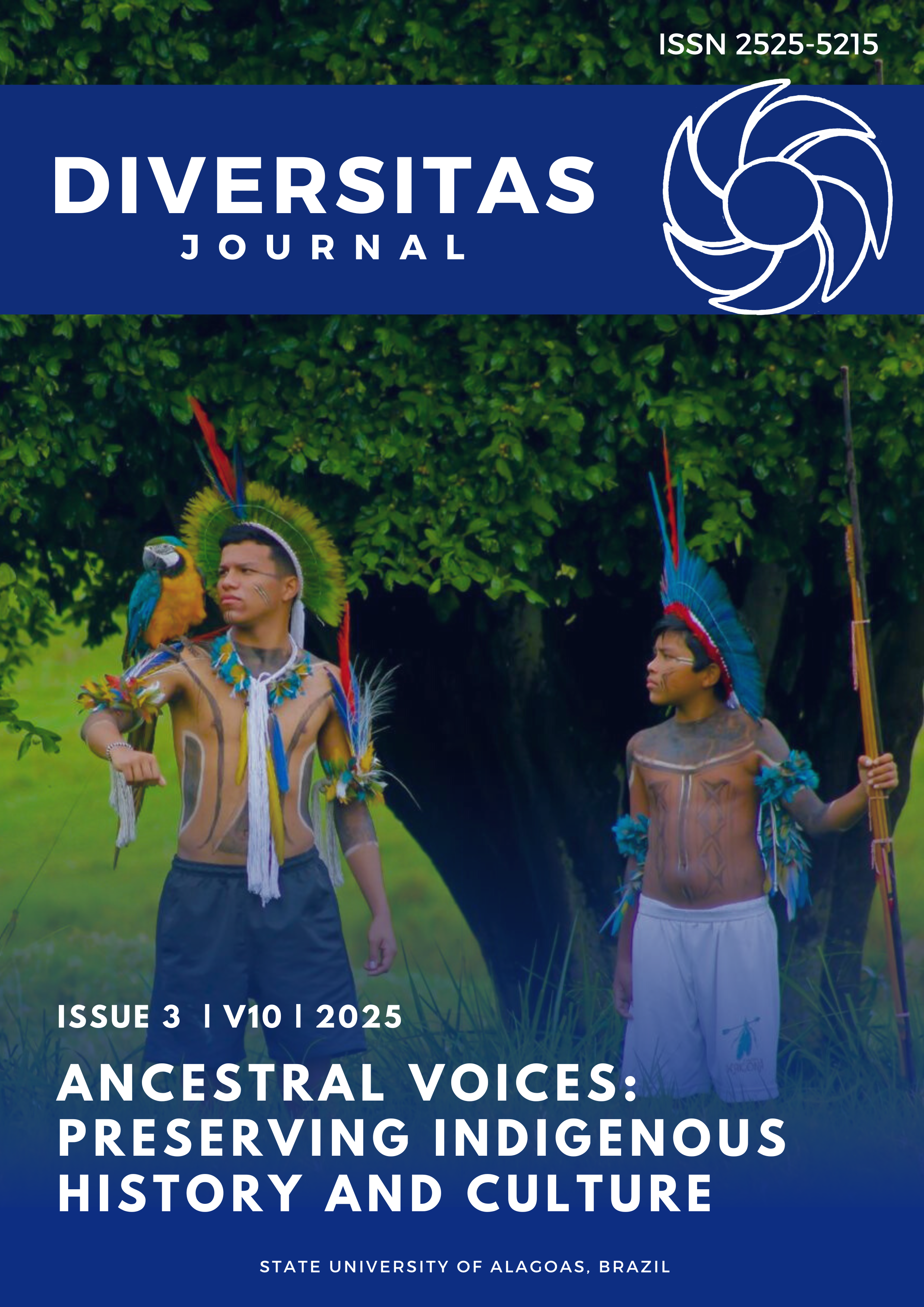
Ancestral Voices: Preserving Indigenous History and Culture
Vol. 10 No. 3 (2025)It is with great pleasure that we present Volume 10, Issue 3 of the Diversitas Journal, dedicated to the theme "Ancestral Voices: Preserving Indigenous History and Culture." This volume is a celebration of the rich traditions and vast knowledge of Indigenous peoples, highlighting the importance of preserving and valuing their histories and cultures. Through a collection of articles and essays, we seek to bring to light the voices of those who, for centuries, have been the guardians of ancestral wisdom, as well as diverse multidisciplinary topics across various sciences and fields of knowledge.
We hope this issue inspires reflection and concrete actions toward the appreciation and respect of Indigenous peoples. May the ancestral voices present here resonate and resonate with each reader, fostering an ongoing and enriching dialogue about the importance of preserving Indigenous history and culture for future generations. As Ailton Krenak aptly put it, "We are so drugged by this harmful reality of consumption and entertainment that we have disconnected from the living organism of the Earth." We thank all contributors and readers for being part of this journey of knowledge and recognition.
-

Urban agroecological food production, a new reality
Vol. 10 No. 2 (2025)Urban agroecological food production emerges as an innovative response to contemporary challenges of food security and sustainability. This model integrates sustainable agricultural practices into urban environments, promoting local production and reducing reliance on long supply chains. Additionally, it strengthens the connection between communities and the environment, encouraging ecological practices and valuing biodiversity.
Urban agroecology not only contributes to food security but also plays a crucial role in mitigating climate change. By reusing organic waste and optimizing the use of natural resources, these practices reduce the carbon footprint associated with food production and transportation. Thus, cities can become more resilient and self-sufficient.
Another important aspect is the social impact. Community gardens and urban agroecological projects promote social inclusion, environmental education, and the empowerment of local communities. These spaces also serve as platforms for knowledge exchange and strengthening community bonds.
Finally, urban agroecological food production represents a new reality that combines innovation, sustainability, and social justice. It is a model that inspires cities worldwide to rethink their strategies for food production and consumption. -

Integrative solutions for the future of Asia: catalyzing graduate research for sustainable development
Vol. 10 No. special_1 (2025)Special Issue 1 of Volume 10, 2025
It is with great excitement that we present the Special Issue 1 of Volume 10, 2025 of Diversitas Journal, entitled “Integrative Solutions for Asia’s Future: Catalyzing Graduate Research for Sustainable Development.” This Special Issue is the result of an exemplary collaboration with Asian Universities, led by APCORE – Asia-Pacific Consortium of Researchers and Educators, Inc.
From January to March 2025, we will receive articles approved by our team of accredited reviewers, with editing led by the renowned Dr. José Crisólogo de Sales Silva (Editor-in-Chief) and Dr. Racidon P. Bernarte and Dr. Joseph Reylan Viray, who are their team serving as editors of the Special Issue. This compendium brings together innovative research and integrative approaches that aim to provide sustainable solutions to the contemporary challenges faced by Asia.
Through this partnership, we aim not only to foster the exchange of knowledge and experiences among researchers from different institutions, but also to inspire new generations of scholars to contribute to the sustainable development of the region. This special issue aims to be a platform for interdisciplinary dialogue and the creation of collaborative networks that transcend geographical and disciplinary boundaries.
We hope that the contributions presented here will offer valuable insights and stimulate fruitful debates on the future of Asia. We thank all the authors, reviewers, and editors who made this volume possible, and we invite our readers to explore the ideas and findings contained within these pages.
-

Science and culture: the fondations of educational development
Vol. 10 No. Especial_2 (2025)Presentation of Volume 10, Special Issue 2, 2025.
It is with great satisfaction that we present Volume 10, Special Issue 2, of 2025, of Diversitas Journal. This edition is composed of articles published at the XIV ENCCULT, Scientific and Cultural Meeting, held in Arapiraca, Alagoas, Brazil, from September 24 to 27, 2024. The theme of this special issue is **"Science and Culture: The Foundations of Educational Development"**.
In this volume, we bring together a diverse collection of research exploring the intersection between science and culture and its fundamental impact on educational development. The selected articles demonstrate the importance of integrating scientific and cultural approaches to promote quality and sustainable education. Our authors, from various institutions and fields of study, share their discoveries and reflections, offering a comprehensive and innovative perspective on the topic.
We invite our readers to delve into the pages of this special issue and engage with the ideas and debates presented here. We thank all participants of the XIV ENCCULT, as well as the reviewers and editors, for their valuable contributions to the creation of this inspiring volume. We hope that this edition fosters continuous dialogue and collaboration between science and culture for the advancement of education.
Se precisar de mais alguma modificação ou outra ajuda, é só avisar!
-
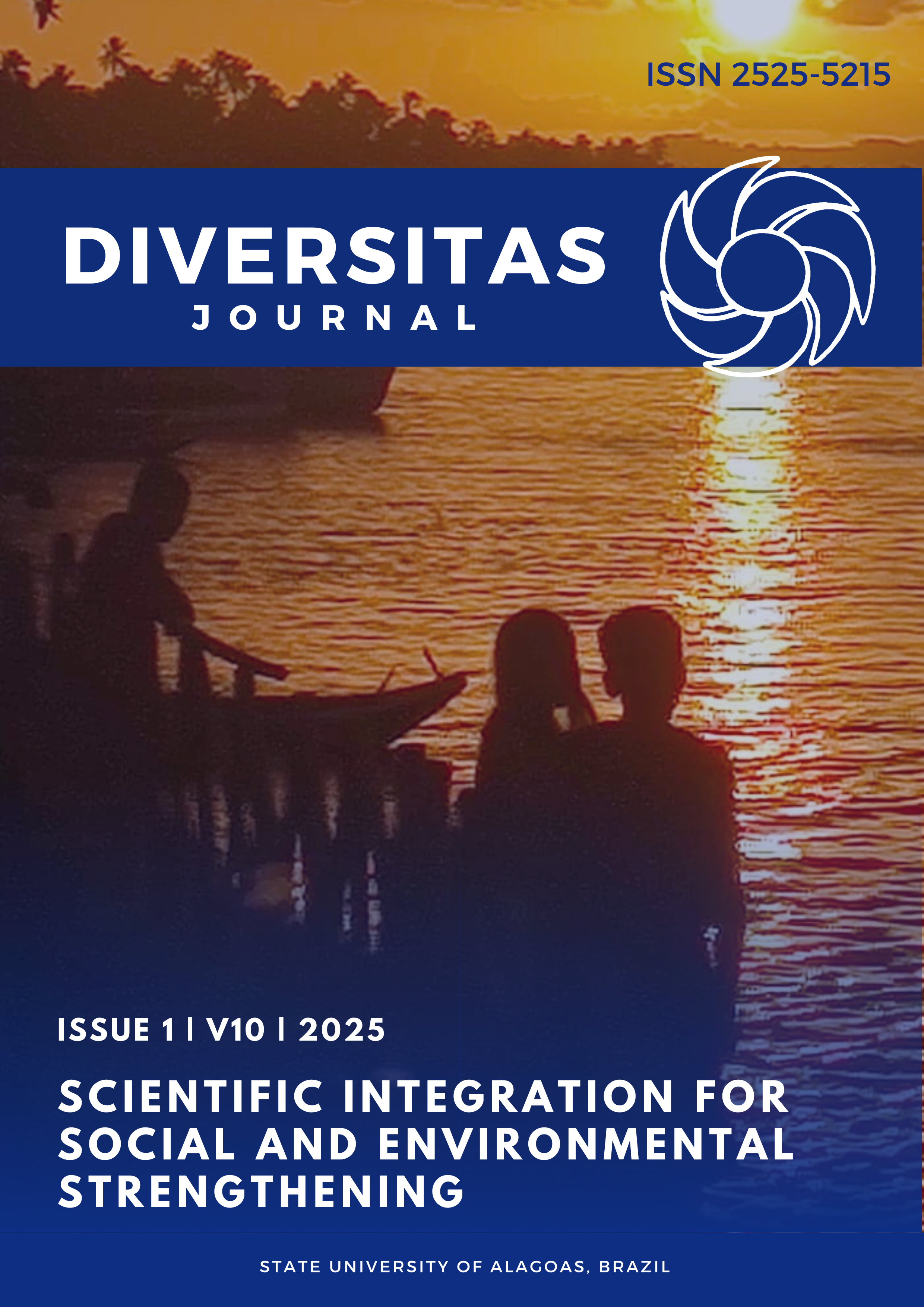
Scientific integration for social and environmental strengthening.
Vol. 10 No. 1 (2025)We are beginning the new jubilee cycle of 2025. In the last 25 years, many social changes have occurred, accompanied by great technological and scientific advances. Geographically, little has changed, but we have had great cultural and behavioral advances, as well as setbacks due to the rise in denialism.
Diversitas Journal has been collaborating with the dissemination of scientific research in various areas, in a multidisciplinary and interdisciplinary manner, reaching several countries and providing the opportunity for the dissemination of open science, accessible to everyone with internet, without corporate pressures.
We are inaugurating a new cycle with a greater number of publications outside the walls of Brazil, integrating Brazil into the world and bringing new realities for access by Brazilians, Latinos and Africans who speak English, Portuguese and Spanish.
We hope to always fulfill the goal of disseminating research that contributes to human and environmental development, in a responsible and sustainable manner.
-
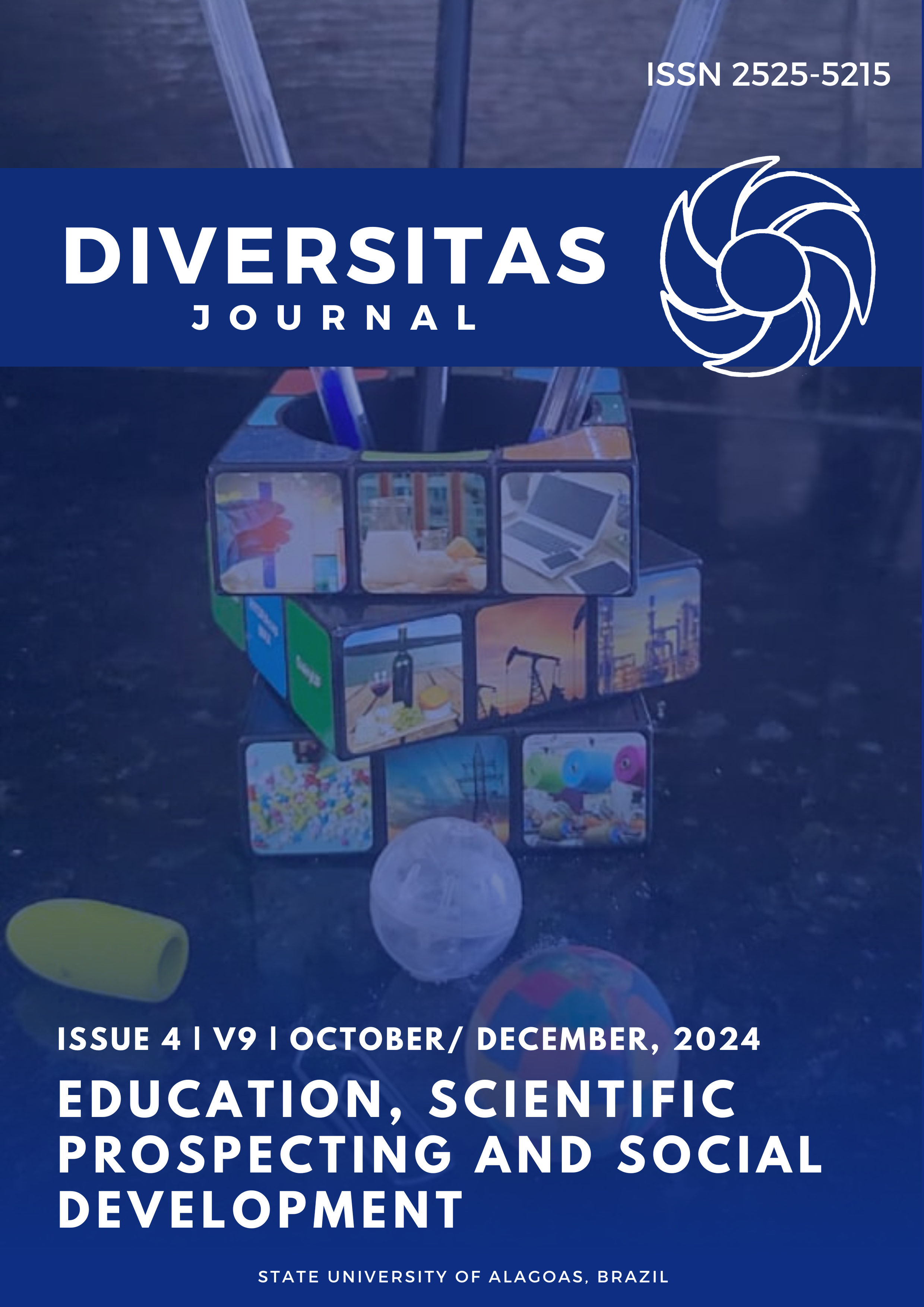
Education, scientific research and social development
Vol. 9 No. 4 (2024)Dear readers, it is with great pleasure that we present volume 9, number 4, of 2024 of the Diversitas Journal, whose central theme is “Education, Scientific Research and Social Development”. This volume brings together articles that explore the intersection between education and science as drivers of social development. Education, as a fundamental pillar of society, is analyzed from different perspectives, highlighting the importance of pedagogical innovation and digital inclusion for the formation of critical and participatory citizens, in a multi and interdisciplinary manner.
Scientific research, in turn, is approached as a crucial element for the advancement of knowledge and the solution of complex problems that affect contemporary society. The articles in this volume discuss everything from the application of new technologies in education to the importance of interdisciplinary research for sustainable development. Science, when combined with education, has the power to transform realities, promoting more equitable and inclusive social development.
Social development is treated as a goal to be achieved through the integration of education and science. The authors present case studies and theoretical analyses, as well as results of applied research, which demonstrate how effective educational policies and investments in scientific research can generate positive impacts on society. This volume of the Diversitas Journal is essential reading for educators, researchers and policy makers who seek to understand and promote social development through education and science. It also brings together the various areas of knowledge and their interdisciplinary congruences.
Prof. Dr. José Crisólogo de Sales Silva
Editor-in-Chief Diversitas Journal.
Cover: Mateus Henrique Gomes da S Bispo
-

Climate change and its impact on Biodiversity
Vol. 9 No. 3 (2024)Climate changes only alter long-term climate patterns, resulting from natural processes and human actions. These transformations affect not only polar bears, but also human health and food production. The increase in solar incidence, the burning of fossil fuels and the destruction contribute to these changes. Furthermore, phenomena such as El Niño and La Niña also play a significant role. Since the formation of the Earth, the climate has been modified, climatic changes are an intrinsic part of evolutionary history.
The third issue of volume 9 of the Diversitas Journal, from 2024, the central theme is “Climate Changes: Causes and Consequences”. The journal will address this question in a multidisciplinary way, exploring the impacts of climate changes on biodiversity, human health, food production and much more. It is essential that the scientific community and general society address these challenges and work together to mitigate the adverse effects of climate change.
With certainty! Research and sharing of knowledge are essential to confront the challenges of climate change and promote a more sustainable future for all. We hope you enjoy the content of this issue to the fullest, written by scientists from various parts of Brazil and other countries.
Prof. Dr. José Crisólogo de Sales Silva,
Editor in Chief
Cover: Fishing for our daily bread
Location: Viçosa, minas Gerais, Brazil in 2022
Photography: - Rodrigo Almeida Pinheiro / Enccult 2023 photography competition
Published: 2024 -10-07 -

Global solution: sustainability and solidarity
Vol. 9 No. 2 (2024)Diversitas Journal brings a new issue of volume 9, covering the months April to June 2024. In this issue we have a very intriguing and current theme: Global solution: sustainability and solidarity.
Sustainability and solidarity emerge as fundamental pillars to face the global challenges that our contemporary society faces. These two interconnected forces offer essential solutions for a more equitable and resilient world.
Sustainability transcends the mere preservation of the environment. It encompasses harmony between human needs, the health of the planet and economic viability. The search for sustainable practices involves reducing excessive consumption, promoting renewable energy, conserving ecosystems and raising awareness about the ecological footprint. Individual and collective actions, such as recycling, responsible water use and adoption of green technologies, are crucial steps towards a more sustainable future.
Solidarity is the ultimate expression of empathy and compassion. It transcends geographic, cultural and social borders. Solidarity involves supporting those less fortunate, sharing resources and fighting inequality. Whether in the form of humanitarian aid in times of crisis, promoting gender equality or defending the rights of refugees, solidarity is a powerful antidote to division and selfishness.
Global Solution: The convergence of sustainability and solidarity is the key to facing global challenges. By adopting sustainable practices, we are contributing to the preservation of our planet and, consequently, to the well-being of all its inhabitants. Solidarity reminds us that we are part of an interconnected global community, and that our individual actions reverberate around the world. Therefore, by promoting sustainability and practicing solidarity, we are building a global solution that transcends barriers and brings us closer to a fairer and more harmonious future.
Prof. Dr. José Crisólogo de Sales Silva
Chief Editor Diversitas Journal.
Cover: Mateus Henrique Gomes da S Bispo
Photography: Maria Jéssica dos Santos Cabral
Photo Title: Diptera ensuring the next generation Date: 15.06.2022.
Diamantina - Minas Gerais, Brazil.
-
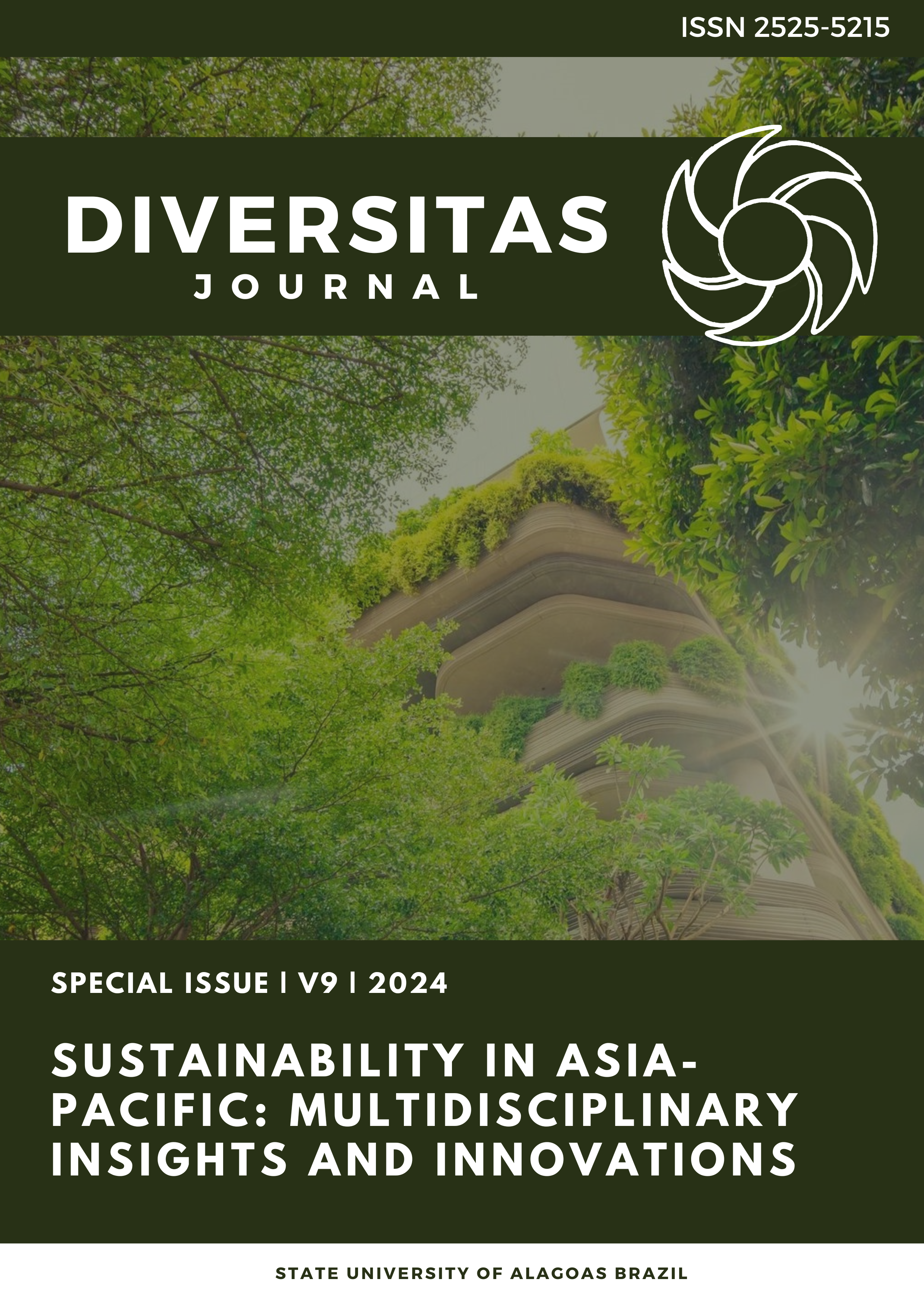
Sustainability in Asia-Pacific: Multidisciplinary Insights and Innovations
Vol. 9 No. 1_Special (2024)This special number in volume 9 of 2024 inaugurates a new phase of international publications with the partnership of the Asia-Pacific Researchers and Educators (Asia-Pacific Consortium of Researchers and Educators Inc.) Piksi, at the Grand Asrilia Hotel, in Bandung, Indonesia, August 29 to 31, 2023.
Researchers from the following univierses participated: Colegio ng Lungsod ng Batangas, Lyceum of the Philippines University-Manila, Bicol University, Rizal Technological University, Far Eastern University - Manila, University of Baguio, Filamer Christian University, Department of Education-Rizal, Isabela State University, University of Mindanao, Abra State Institute of Sciences and Technology, Cavite State University, Mindoro State University, University of Mindanao - Main Campus, Philippine Normal University, Emilio Aguinaldo College, Universidad De Manila, Polytechnic University of the Philippines, University of Santo Tomas, Quezon City University, oliteknik Piksi Ganesha.
For the editors involved and all the diverse team Journal was very pleasant all the effort in this construction. 36 articles will be published during March.
We all want a good reading. -

Urban spaces and their contradictions
Vol. 9 No. 1 (2024)We start the year 2024 with another volume, number 9, and the first issue of Diversitas Journal with the theme: Urban spaces and their contradictions. Based in the interior of Alagoas, Santana do Ipanema, Brazil, we have become global due to the possibility of electronic publications, with greater opportunities for open dissemination of research carried out in different countries instantly, as soon as they are published.
We will seek, in each issue, to bring current themes on the world stage, produced by researchers from different universities, striving for originality, innovation, originality, ethics in publication and production, humanism in research, registration of historical moments, with important local and international research.
The contributions of the Diversitas Journal are very important in the development of people, institutions and regions. From daily searches on the site, many researchers find solutions to their questions, concerns. A network that helps each other globally, the spontaneous union of research in an open way, providing students and researchers with access to immediate knowledge.
We make available with great care another issue, inaugurating volume 9. I hope that all readers and researchers will use this electronic platform, and produce more and more every day for the good of society, balance and equity, food production, education, endemic disease control and physical and mental health, entertainment and electronics, spirituality and truth. May wisdom be the final affirmation of this work with and for all, with 1 volume, 4 annual issues in continuous submission, dossiers and special issues.
PhD Teacher José Crisólogo de Sales Silva,
Editor-in-Chief.
Cover: The colors of routine
Location: Diamantina, Minas Gerais, Brazil
Photography: Rodrigo Almeida Pinheiro - Enccult 2023 photography competition
Published: 2024 -10 -01
-
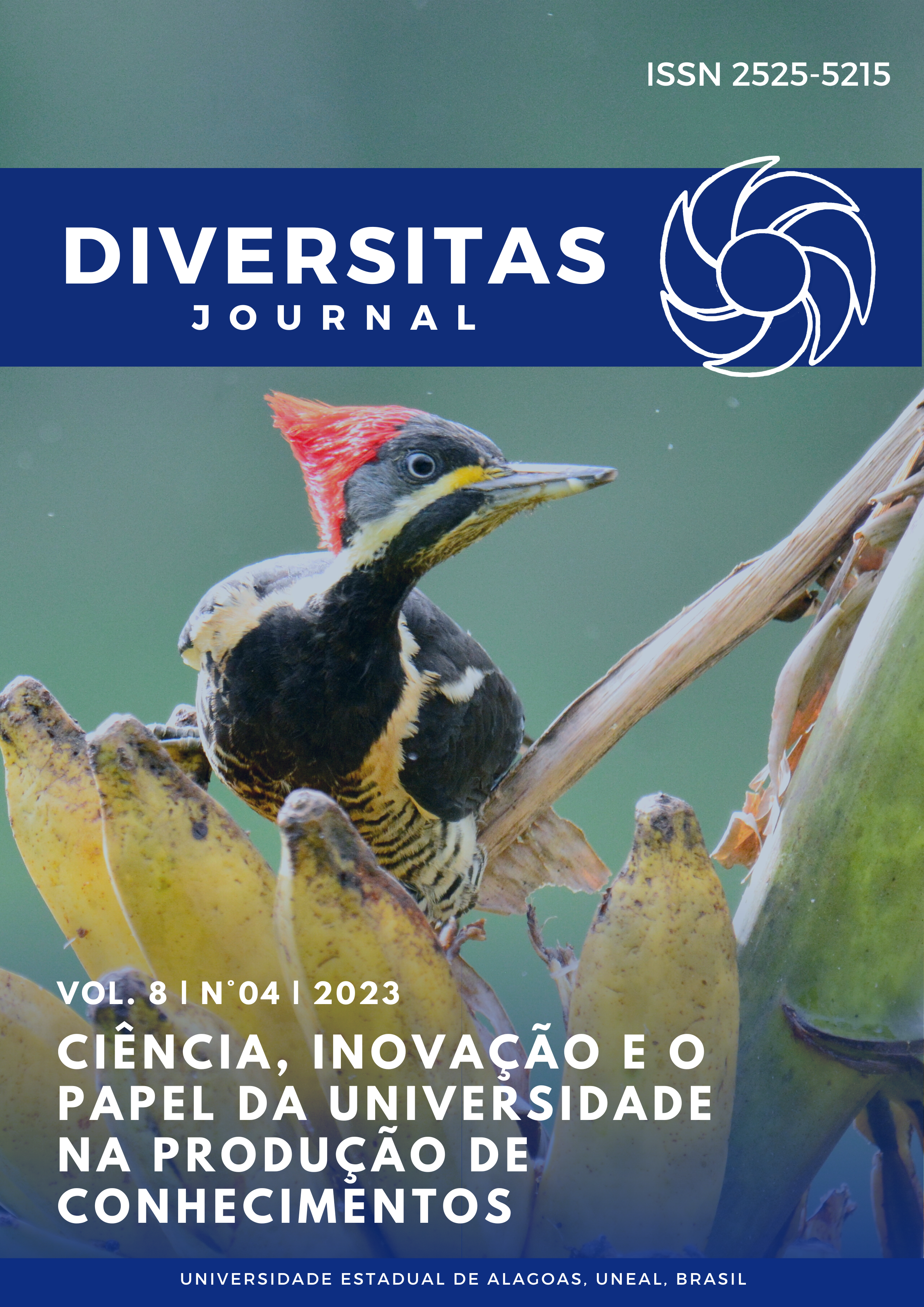
Science, innovation and the role of the university in the production of knowledge
Vol. 8 No. 4 (2023)We present to the academic community and society in general another issue of volume eight, from 2023. This issue has a continuous flow of submission and publication.
The various multidisciplinary and interdisciplinary areas are covered. In the monthly discussion, we bring the current role of the University and Science in innovation and in the solution of social demands. A constant theme, in which each link in this chain of knowledge has its role, how they congruate and how one is present in the performance of the other.
In these terms, we include articles with very diverse themes, with the possibility for readers and researchers to enter into multiple and diverse thoughts, with scientific care in their production, fruits of the work of teachers and students in the most diverse universities and postgraduate programs.
We wish you all a great read.
Diversitas Journal Editors.
Cover: White-banded Woodpecker (Scientific name: Dryocopus lineatus)
Location: Quebrangulo, Alagoas, BrazilPhotography: Sergio Leal
-
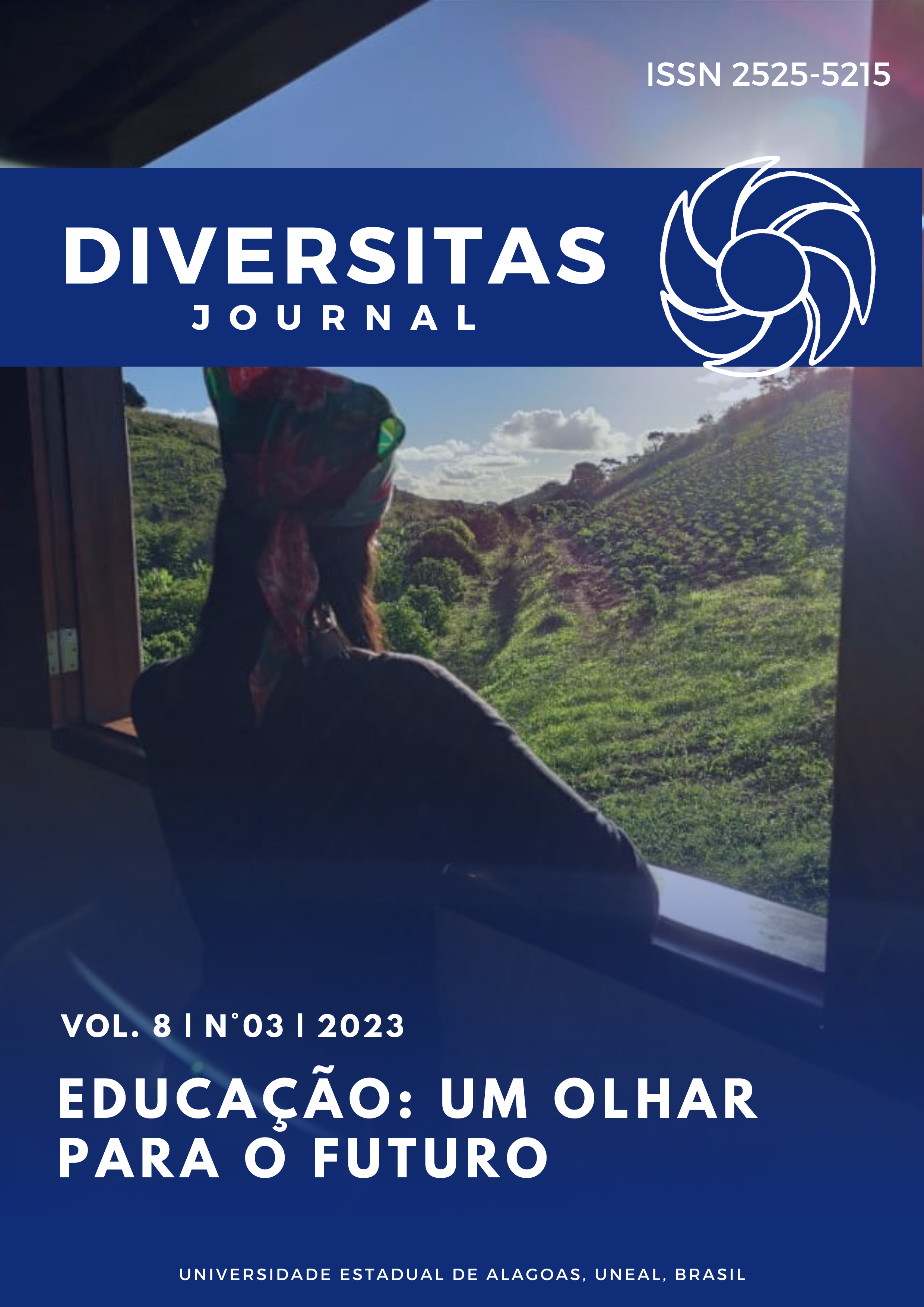
Education: a look to the future
Vol. 8 No. 3 (2023)Most Dear and Illustrious Readers, Researchers,
The present number 3 of volume 8 of 2023 inaugurates a new publication methodology, with a continuous format.
In 2023 we will continue with the publication of 4 volumes, being this or the third, July to September, being that during the following months we will also have new articles being published in this number 3, we wish everyone to use the articles published here for the best purposes.
We also started from this issue an international partnership with the Asia-Pacific Consortium of Researchers and Educators, INC. APCORE – headquartered in the Philippines, we hope it will be the beginning of many joint works and disclosures.
-

Through the Lens: The Importance of Biodiversity for Environmental Balance
Vol. 8 No. 2 (2023)Another issue of Diversitas Journal, with great care, scientists, teachers and students producing science and keeping us informed through their articles, opinions and cases. In this issue we bring 56 articles in various areas of knowledge, which together show us their interdisciplinarities.
The multidisciplinary character of Diversitas Journal brings a possibility of reaching a very diverse and fantastic audience, donating the best of itself, its natural resources and knowledge.
It´s observed in social life that professionals and society are intertwined in their daily activities and occurrences, with scientific, service and primary occupations, with multidisciplinary understandings, with broad needs, permeated by problems and diverse resolutions, which does not constitute an obstacle in the dynamics of solutions, adaptations and daily practices of all citizens.
Based on the multidisciplinarity of everyday social life, we provide another number with articles that bring answers to questions in different areas, which in addition to empirical knowledge help each other. They are articles in the areas of Agrarian, Environmental, Biological, Economic, Medical, Accounting, Human, Applied Social, Health, Exact Sciences and Education and Teaching.
In conclusion, we wish everyone a great reading and use of the information offered here to every earthly society, as a collective collaboration in the construction of a more cultured, egalitarian and just society.
The editors.
Cover Photography. Title: Parasitoid wasp Brachymeria sp. (Hymenoptera: Chalcididae) feeding on pollen from Paepalanthus sp. Author: Rodrigo Almeida Pinheiro. Location: Diamantina – MG. Brazil.
-
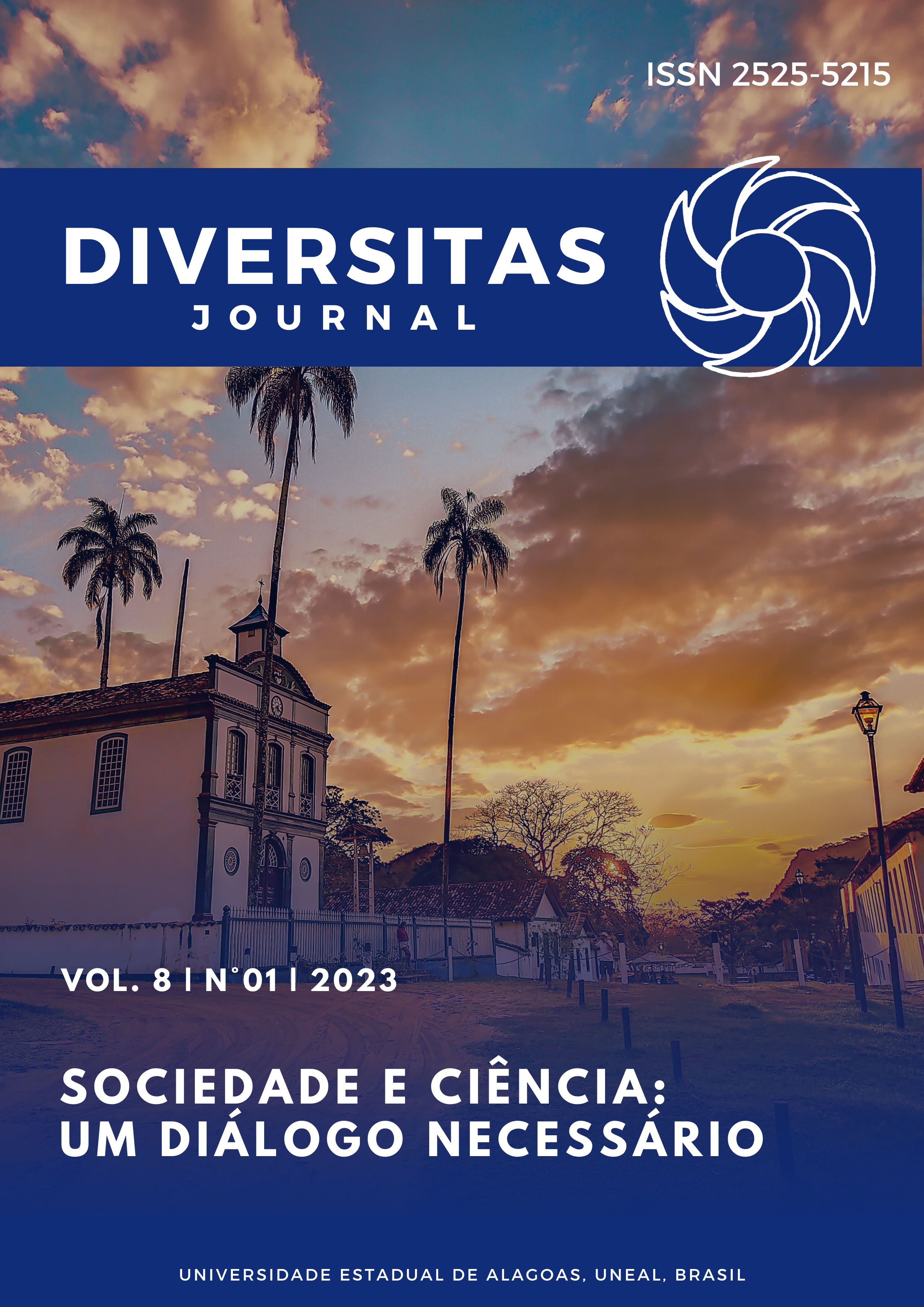
Society and science: a necessary dialogue
Vol. 8 No. 1 (2023)"Hoje você é quem manda
Falou, tá falado
Não tem discussão, não
A minha gente hoje anda falando de lado
E olhando pro chão, viu
Você que inventou esse estado
E inventou de inventar
Toda a escuridão
Você que inventou o pecado
Esqueceu-se de inventar
O perdão"É com esta canção de Chico Buarque, composta nos anos de 1970 que convidamos a você leitor adentrar no conjunto das coisas ditas e escritas organizadas pela Diversitas Journal, volume 8, edição 01 de 2023. Destacamos que o compêndio de artigos dos mais variados campos de domínio aqui postos, Com o tema Sociedade e Ciência: um diálogo necessário. Esta temática é bem oportuna porque vivenciamos esta edição no período ainda da Pandemia do Covid-19, por isso foi híbrido. Período instalado desde 2020 com muita negação a Ciência. Isso mesmo, as Vacinas para o combate ao Covid-19 chegaram muito tarde ao Brasil, ocasionando assim um alto índice de mortalidade. Desta feita, sugerimos a canção “Apesar de você” para entendermos que apesar de toda a realidade antidemocrática é possível sonharmos e entendermos que “amanhã há de ser outro dia”.
Sociedade e Ciência: um diálogo necessário nos possibilita enfrentar todas as formas de negação da produção do conhecimento, que inclusive salva vidas! Compreender a importância da Ciência para produção do conhecimento e validação dele por meio de seus produtos é um grande feito que todos os cientistas alcançam. Por isso, a Sociedade precisa caminhar de mãos dadas com a Ciência, pois é por meio dela que a Sociedade pode ser transformada, que as injustiças sociais podem vir ser combatidas, que as desigualdades sociais podem ser amenizadas e que as diferenças podem ser respeitadas. O conhecimento é um artefato transformador na vida de toda a Sociedade, tanto quando ela produz quanto ela consome o conhecimento produzido, a título de exemplo: as Vacinas.
É com esta poesia dialógica entre a Sociedade e a Ciência que teremos condições favoráveis para reconstruir um Brasil de todos e para todos os brasileiros, onde todas e todos os seres humanos possam ter comida em suas mesas, onde as injustiças sociais sejam ceifadas feito ervas daninhas, onde as desigualdades sociais possam por meio de políticas públicas justas e inclusivas favorecerem para o ‘a manhã renascer, esbanjar poesia, o céu clarear, o coro cantar, na sua frente’. A liberdade ser vivenciada de forma soberana através das condições favoráveis que teremos para repensar, reconstruir e reviver uma Sociedade Democrática, Solidária e Fraterna. Onde a Ciência deve estar em primeiro lugar para que possa contribuir com as transformações sociais, políticas, econômicas e históricas do nosso mundo a favor de toda a Sociedade brasileira sem distinção de raça, etnia ou gênero, fazendo jus a promoção da Educação em Direitos Humanos.
Por conseguinte, te convidamos leitor a penetrar em cada área de conhecimento e escavar os saberes necessários para tua mudança pessoal e profissional. Entender que a função da Revista Diversitas Journal é proporcionar a circularização do conhecimento, é estabelecer a ponte para o inédito viável, para transformação social, pessoal e profissional. Portanto, este compêndio cumpre a missão de estabelecer o diálogo entre a Sociedade e a Ciência, ressignificando assim a sua própria vida, sua própria existência, ousemos sempre ser mais por meio do conhecimento que acessamos e dos saberes que nos atravessam em sermos quem somos e como somos, por isso, ousemos ser sempre mais e melhores em nossa e para nossa Sociedade e Ciência brasileira.
Verão de 2022,
Professora Doutora Maria Aparecida Vieira de Melo, UFRN.
Capa: Fotografia: Milena Kristhie Nascimento. Local: Vila do Biribiri - Diamantina/Minas Gerais
-

The strength of associations is always an alternative for development
Vol. 7 No. 4 (2022)With great satisfaction we deliver another Diversitas Journal issue to society. Another fruit of research scientists from universities and communities across Brazil and the world. We maintain the characteristic of disseminating research on current themes, in an interdisciplinary and multidisciplinary way.
In this volume 7 number 4, we bring 7 articles in Agricultural Sciences, 4 in Environmental Sciences, 8 in Biological Sciences, 2 in Exact Sciences, 9 in Health Sciences, 3 in Applied Human and Social Sciences, 5 in Economics, Administration and Development, 9 of Education and Teaching, 3 of Linguistics and Literature, third series of the Thematic Dossier - Reports of experiences in the scope of PIBID and PRP with 25 articles and finally a new publication: Thematic Dossier: Political Economy, Applied Economics and Regional Development with 6 articles.
With this information, we wish to provide scientific ammunition for updates and new research in all parts of the world where the topics discussed here are of interest. To all our readers and researchers, a good reading and lots of scientific information for development.
-

Contributions of science and technology to society
Vol. 7 No. 3 (2022)With immense pleasure we bring you another Diversitas Journal issue. In this number 3 of volume 7, 62 articles of great care and responsibility by our authors in several universities spread across Brazil are presented. We travel through Biological, Agricultural, Environmental, Human Sciences, and continue with Linguistics, Education and Teaching, and we have a discussion in the self-interview format.
We hope that our themes presented will be of interest to you, for the good of society as the result of those who focus on building a better world, offering their knowledge and their personal and research group time.
Editorial Team
-

Pedagogical methodologies and practices: the importance in teacher training
Vol. 7 No. 2 (2022)In this issue, the Diversitas Jornal journal addresses relevant studies on a wide range of interdisciplinary themes. We bring important contributions from Agricultural Sciences that point out seed analysis procedures and plant metabolisms. In Biological and Environmental Sciences, we highlight topics on fertilization, soil correction practices, and the sustainability of Watersheds. In Health Sciences, we present rich discussions on people with disabilities, the elderly, and pregnant teenagers and their specific needs, such as sexual planning and the importance of prenatal care. Educational issues are also emphasized in this area, covering the importance of health-oriented planning in schools as a teaching-learning resource and approaches to mental health. We also highlight Education and Teaching, with themes that encompass discourse analysis, remote teaching, children's literature, and the recording of the reactions of quilombola children from the backlands of Alagoas during the pandemic.
We also offer our readers the Dossier on Experience Reports in the Scope of PIBID and PRP, organized by professors who coordinate PIBID and PRP at the Federal University of Alagoas. The Dossier presents approaches to the methodologies and pedagogical practices developed by coordinators, supervisors, preceptors, PIBID students and residents in their daily activities in pedagogical activities in the field of different disciplines in the school environment, a privileged place for the interaction of knowledge in the teaching-learning process. This Dossier is the first in a series of 4, which will be published over the next Diversitas issues, due to the great demand for articles received, which highlights the importance of PIBID and PRP in teacher training in Brazil.
We wish everyone a good read and take the opportunity to cite the works of authors from all over Brazil and other countries.
Editors Diversitas Journal
-

Breaking paradigms and social changes: the new challenges for science
Vol. 7 No. 1 (2022)As novas quebras de paradigmas apresentadas no contexto social e economico, em tempos de Pandemia Sars-Cov 19 tem determinado novos paradigmas para o desenvolvimento e funcionamento das estruturas de pesquisa e aprendizagem em geral. Novos procedimentos que garantem o mínimo de estrutura para manutenção dos estudos poss´íveis foram apresentados como saída para não estagnar a ciência, principalmente em pesquisas em andamento. Mas o ensino sofreu muita mudança com a nova necessidade do ensino remoto.
Por outro lado, a ciência se mostrou, e aparece, como única forma de vencer a Pandemia, e como esperança de retorno a rotina normal de existencia social em sua normalidade de trabalho e sobrevivência intelectual.
Neste numero, e em todo o ano do 2022, estaremos continuamente nos referindo aos novos paradigmas e as mudanças sociais, na educação: no ensino, na pesquisa e na extensão, assim como no normal da convivencia social, o desenvolvimento das novas rotinas de trabalhos, as realidades nos estágios, no trabalho essencial da saúde, da produção de alimentos, da manutenção da fé criadora, e no mundo real.
-

Education realities in the Sars-Covid19 Pandemic
Vol. 6 No. 4 (2021)REALITIES OF EDUCATION IN THE SARS-COVID-19 PANDEMIC
Since the 1990s, the education sector has been undergoing profound changes, following the transformations that occurred in the productive structure, with different patterns of sectoral modernization. The accelerated restructuring of the capitalist production system has accentuated the gap between the top and bottom of the social pyramid, as access or access barriers to equipment and data transmission networks have defined a new pattern of social exclusion.
Covid-19 accelerated the transition process from in-person activities to teleworking, ignoring the structural barriers to accessing equipment and digital platforms, in addition to the learning time required to use new tools. In education, the qualitative results of training at all stages of teaching are questionable. Furthermore, new digital barriers ensure a competitive advantage for residents of urban areas, with higher incomes and higher levels of education, deepening social exclusion.
It is not yet possible to accurately assess all the effects of this forced acceleration, nor does this collection exhaust the debate, although it makes an excellent contribution to the understanding of the phenomenon, problematizing the process in light of the social, cultural, political and economic dimensions. Is it possible to measure the quality of teaching compared to the pre-pandemic phase? From the perspective of education professionals, is it possible to measure the intensification of work, the real length of the journey, the degree of home invasion and the effects on the physical and mental health of those involved? What is the reach of remote classes, in different regions of the country? We invite you to embark on this reflective journey. Good reading.
Luciana Caetano da Silva[1]
[1] Professor at FEAC/UFAL and lead researcher at GDIMT - Dimensions and Dynamics of the World of Work Research Group.
-

Culture and tourism hand in hand with territorial development
Vol. 6 No. 3 (2021)The integration between culture and tourism is fundamental for sustainable territorial development. Culture, with its artistic manifestations, traditions and historical heritage, attracts visitors and promotes local identity.
Tourism, in turn, generates income and encourages the conservation of these cultural values. When well planned, tourism can reinforce local culture and contribute to the economy without compromising the natural resources or cultural essence of communities.
Examples of this are ethnotourism and community-based tourism, which value traditional populations and promote respectful interaction between visitors and local communities. These practices are essential for preserving the cultural and environmental identity of a territory, while providing an authentic and enriching experience for tourists.
In this new volume of the Diversitas Journal, we are bringing to the scientific public 47 articles produced in Brazil and abroad, by different Universities on their different themes.
Agricultural Sciences with ten articles of great importance in the subareas of Microbiology, Seeds, Phytopathology, among others. Environmental Sciences with four articles representing subareas of biological interest and environmental preservation. Biological Sciences, also with four very representative articles in the area, with important points of applied science in human health and livestock farming. Health Science with important current texts with interventions in health and health teaching, including parasitology and endemic diseases. Applied Social Sciences represented in six articles that discuss Brazilian realities. Education and Teaching with nine articles discussing the Pandemic and remote teaching technologies, among other topics. Literature and linguistics with the article Afro-Brazilian literature as a contribution to an anti-racist education: the short story A Escrava and ending number 3 of volume 6 Diversitas Journal, we have Zootecnia and Recursos Pesqueiros with two articles discussing the formulation of feed and hygiene in collection of bovine milk. We hope you enjoy reading our articles.
-

Education for socioeconomic development
Vol. 6 No. 2 (2021)Education is a fundamental pillar for the socioeconomic development of any nation. It not only equips individuals with skills and knowledge needed for the job market, but also promotes innovation, productivity and economic growth.
In Brazil, education has been recognized as an essential driving force to transform the country's development, where more than 30% of workers do not have complete basic education. It is crucial to ensure that these individuals complete at least secondary education and have access to professional courses that prepare them for a globalized and complex economy.
Furthermore, implementing an educational system that is aligned with social, scientific and technological advances is key to increasing competitiveness in all sectors of the economy. Countries that invest in consistent and continuous public policies in education, as demonstrated by the success of nations like Vietnam in international assessments, show that it is possible to overcome socioeconomic challenges and achieve sustainable and inclusive development.
This second issue of the sixth volume features the Diversitas Journal themed Dossier, which has as its theme “Development and Sustainability”. This Dossier was designed and conducted by the Group of Research Center of Studies in Eco-development, Ruralities and Management (CEERG), based at the Campus Sertão of the Federal University of Alagoas, which comes to hold an interdisciplinary discussion on development and sustainability, whether in the rural environment or urban. It also aims to provide a debate of ideas, exposition of experiences and understanding and systematization of knowledge within the scope of the issues that guide ecodevelopment, the diverse ways in which ruralities are expressed in Brazil and on the management of natural resources, based on scientific articles. which present content (research) relevant to this discussion.
-

Practices and reflections on teaching, research and extension
Vol. 6 No. 1 (2021)The role of science in building a new society with greater
opportunities to guarantee comfort and social well-being are presented to each actor
researcher at various levels of production spread across the country and the world. Same
With few financial resources, our researchers in each space reinvent the way
to extract your best, individually and collectively, to build a better world.
The first issue, of the first volume Diversitas Journalem 2021, has the theme: “Practice and reflections on teaching, research and extension”. In this sense, the Diversitas Journal, in Alagoas, Brazil, contributes to the socialization of scientific knowledge, art and culture. We hope you enjoy reading the articles presented.
The integration of teaching, research and extension represents a fundamental pillar in academic training, promoting a holistic education that prepares students for real-world challenges. Action research, for example, is a methodology that strengthens this integration, allowing students to actively participate in solving concrete problems, while at the same time developing critical and reflective skills. This collaborative approach between university and community expands learning opportunities, enriching the educational experience with practical experiences and theoretical reflections.
Extension programs, such as Educação Infantil na Roda, stand out for offering training experiences that are based on the tripod of university action, contributing significantly to the plural education of students.
Furthermore, critical action research highlights the importance of dialogue between universities and basic education, expanding spaces for participation and debate on educational policies. These innovative and reflective practices are essential for an education that transcends theoretical knowledge and engages with the social and cultural reality of students. -

Family farming: the basis of the Latin American economy
Vol. 5 No. 4 (2020)Family farming plays a fundamental role in the Latin American economy, serving as a vital cornerstone for ensuring food security and promoting sustainable development. This agricultural model is characterized by crop diversity, the use of traditional practices, and the adoption of innovative techniques that respect the environment. Beyond providing food for millions, family farming stimulates local markets and strengthens rural economies.
Rural communities in Latin America rely heavily on family farming, not only as a source of sustenance but also as a means to preserve their cultural and social traditions. This system significantly helps reduce inequalities and creates economic opportunities in areas with limited resources. Its impact reflects the importance of integrating social development with environmental conservation.
The edition of volume 5, number 4, of 2020 of Diversitas Journal, published by the State University of Alagoas, delves into this topic in depth. The publication provides a detailed perspective on the challenges and opportunities facing family farming, emphasizing its role in the economy, sustainability, and social welfare. It is essential reading to understand its importance within the Latin American context.
-

Social networks ensure development
Vol. 5 No. 3 (2020)Social networks have become essential tools for development in various fields, fostering connections between individuals, communities, and institutions. They play a crucial role in disseminating information, driving social mobilization, and creating economic opportunities, especially in contexts where access to resources is limited. Volume 5, number 3, of 2020 of the Diversitas Journal, from the State University of Alagoas, explores how these digital networks can be leveraged to promote social and economic progress.
The edition highlights the transformative power of social networks, enabling marginalized groups to gain voice and visibility. Through digital platforms, spaces for dialogue and collaboration can be created, where innovative ideas can flourish and solutions to complex challenges can be found. The journal examines concrete cases and provides insights into the impact of social networks on sustainable development.
With the title Social Networks Ensure Development, this edition of the Diversitas Journal offers a comprehensive analysis of the role of digital networks in building a more inclusive and connected future. It is essential reading for those seeking to understand how technology can be a powerful ally in promoting human and social development.
-

The feminine force in the consolidation of History
Vol. 5 No. 2 (2020)Volume 5, number 2, of 2020 of the Diversitas Journal, titled The Feminine Force in the Consolidation of History, highlights the essential role of women in the construction and transformation of societies throughout time. This theme addresses how women, often overlooked in historical records, have played fundamental roles in social, cultural, and political movements, significantly shaping the course of history. The edition aims to shed light on these contributions, fostering critical reflection on the importance of recognizing and valuing these narratives.
The publication brings together articles that explore different historical and cultural contexts, showcasing the feminine force in various spheres, from the fight for civil rights to leadership in local communities. Additionally, the edition discusses the challenges faced by women throughout history, such as gender inequality and social exclusion, highlighting their strategies of resistance and resilience. These accounts provide an enriching perspective on the transformative capacity of women.
With an interdisciplinary approach, this edition of the Diversitas Journal invites readers to revisit history through a new lens, recognizing women as protagonists of significant changes. It is essential reading for those who wish to understand the depth and breadth of women's contributions to the consolidation of history and the construction of a more equitable future.
-

Education with diversity, society with sustainability
Vol. 5 No. 1 (2020)Volume 5, number 1, of 2020 of the Diversitas Journal, titled Education with Diversity, Society with Sustainability, addresses the importance of inclusive and diverse education as a foundation for building a sustainable society. The edition highlights how cultural, social, and environmental diversity can be integrated into the educational process, promoting a more comprehensive formation aligned with contemporary challenges.
The articles in this edition explore different perspectives on education for diversity, including innovative pedagogical practices and public policies that encourage inclusion. Additionally, the positive impacts of an educational approach that values plurality are discussed, both in the formation of conscious citizens and in the promotion of a more equitable society.
The publication also emphasizes the relationship between education and sustainability, showing how teaching can be a powerful tool for raising awareness about environmental and social issues. Through practical examples and theoretical reflections, the authors present ways to integrate these concepts into school life and community activities.
With an interdisciplinary approach, this edition of the Diversitas Journal invites readers to reflect on the transformative role of education in building a more inclusive and sustainable future. It is essential reading for educators, researchers, and anyone interested in promoting positive changes in society.
-

Local and territorial development and the collaboration of science
Vol. 4 No. 3 (2019)Volume 4, number 3, of 2019 of the Diversitas Journal, titled Local Development, Territorial Management, and the Collaboration of Science, explores how science can act as a catalyst for sustainable development in different territories. The edition highlights the importance of integrating scientific knowledge with local practices, promoting innovative solutions tailored to the specific needs of each region.
The articles in this edition address topics such as territorial management, the valorization of natural and cultural resources, and the role of communities in building development strategies. Additionally, case studies are presented to illustrate how collaboration between science and society can generate positive and lasting impacts.
With an interdisciplinary approach, this edition of the Diversitas Journal invites readers to reflect on the relevance of science as a tool for strengthening local communities and promoting a more balanced and sustainable future. It is essential reading for researchers, policymakers, and anyone interested in territorial development.
-

Society, health and nature, in search of balance
Vol. 4 No. 2 (2019)Volume 4, number 2, of 2019 of the Diversitas Journal, titled Society, Health, and Nature: In Search of Balance, addresses the interconnectedness between social aspects, human health, and environmental preservation. The edition highlights how these elements are deeply linked and how balance among them is essential for sustainable development and collective well-being.
The articles in this edition explore topics such as the importance of public health integrated with environmental policies, the impact of social practices on nature conservation, and the challenges faced by communities in the pursuit of sustainable balance. Additionally, case studies are presented to illustrate successful initiatives of integration between society, health, and nature.
With an interdisciplinary approach, this edition of the Diversitas Journal invites readers to reflect on the necessity of building a future where social, health, and environmental aspects are harmonized. It is essential reading for researchers, policymakers, and anyone interested in promoting a more balanced and sustainable world.
-
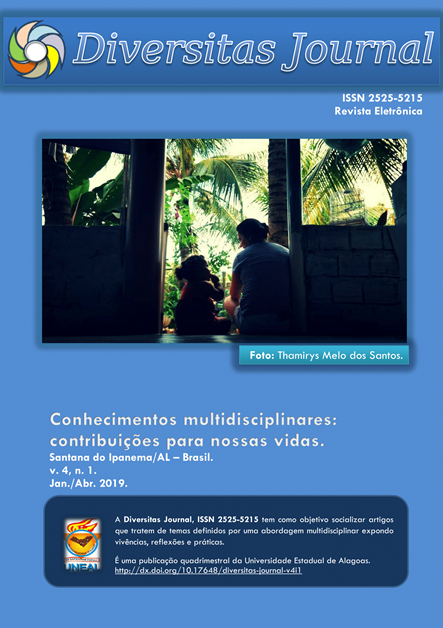
Multidisciplinary knowledge: contributions to our lives
Vol. 4 No. 1 (2019)Volume 4, number 1, of 2019 of the Diversitas Journal, published by the State University of Alagoas (ISSN 25255215), presents the theme Multidisciplinary Knowledge: Contributions to Our Lives. This edition highlights the importance of integrating different fields of knowledge to address contemporary challenges and promote innovative solutions. A multidisciplinary approach is essential to understand the complexity of today's world and propose pathways that unite science, society, and sustainability.
The articles in this edition explore how collaboration between disciplines can enrich academic research and generate positive impacts on everyday life. From health to education, including technology and the environment, the authors present studies that demonstrate the relevance of combining knowledge to achieve broader and more effective results.
Additionally, the edition emphasizes the need to value dialogue between different fields of knowledge, promoting an exchange of ideas that strengthens innovation and creativity. This perspective is crucial to tackling global issues such as climate change, social inequality, and technological advancements.
With an interdisciplinary approach, the volume also highlights the importance of including local communities in the process of knowledge construction. The interaction between academic and popular knowledge is presented as a powerful strategy to promote sustainable development and social inclusion.
Readers will find in this edition profound reflections and case studies that illustrate how multidisciplinary knowledge can transform realities. The diversity of topics addressed reflects the commitment of the Diversitas Journal to fostering relevant and timely debates.
This edition is essential reading for researchers, educators, policymakers, and anyone interested in understanding how the integration of different fields of knowledge can contribute to a more balanced and sustainable future.
-
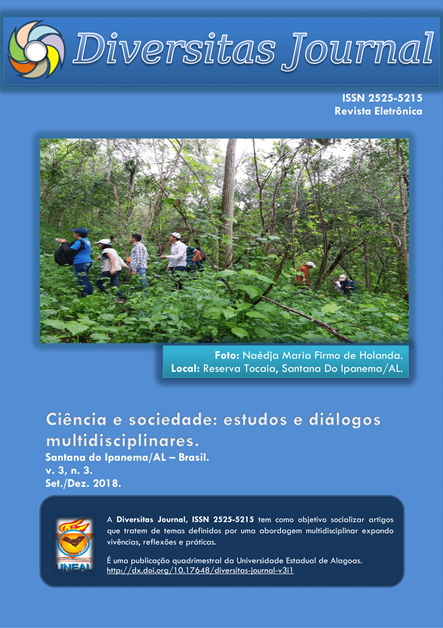
Science and society: multidisciplinary studies and dialogues
Vol. 3 No. 3 (2018)Volume 3, number 3, of 2018 of the Diversitas Journal, published by the State University of Alagoas (ISSN 25255215), presents the theme Science and Society: Multidisciplinary Studies and Dialogues. This edition highlights the importance of interaction between science and society, promoting dialogues that expand the understanding of contemporary challenges and encourage innovative solutions. A multidisciplinary approach is essential to connect different fields of knowledge and build bridges between theory and practice.
The articles in this edition explore how science can contribute to social, cultural, and environmental development, addressing topics such as education, health, and sustainability. Additionally, case studies are presented to illustrate the practical application of scientific knowledge in diverse contexts, showcasing its positive impact on everyday life.
The publication also emphasizes the need to strengthen collaboration among researchers, communities, and institutions, fostering open and inclusive dialogue. This interaction is crucial to tackle global issues such as climate change, social inequality, and technological advancements, with solutions that benefit society as a whole.
With an interdisciplinary approach, this edition of the Diversitas Journal invites readers to reflect on the transformative role of science in building a more balanced and sustainable future. It is essential reading for researchers, educators, and anyone interested in understanding how the dialogue between science and society can drive significant change.
-

Hands that transform: raw materials in local development
Vol. 3 No. 2 (2018)With joy, we present volume 3, number 2, of 2014 of the Diversitas Journal, published by the State University of Alagoas (ISSN 25255215), with the theme Hands that Transform: Raw Materials into Local Development. This edition celebrates the importance of raw materials as the foundation for sustainable development and the empowerment of local communities. The articles explore how natural and cultural resources can be transformed into opportunities for economic and social growth.
The texts in this edition highlight creativity and innovation as fundamental elements for transforming raw materials into products that generate positive impacts on communities. Additionally, case studies are presented to illustrate how the responsible and strategic use of resources can promote territorial development and strengthen cultural identity.
The publication also emphasizes the role of the hands that work directly with raw materials, showcasing the importance of traditional knowledge and local practices. These insights are essential for creating solutions that respect the environment and promote social inclusion.
-

Environmental education, a necessary intervention
Vol. 3 No. 1 (2018)With great enthusiasm, we once again present volume 3, number 1, of 2018 of the Diversitas Journal, published by the State University of Alagoas (ISSN 25255215), with the theme Environmental Education: A Necessary Intervention. This edition highlights the urgency of integrating environmental education as an essential pillar for building a more conscious and sustainable society. The articles explore how education can be a powerful tool to promote changes in behavior and attitudes toward the environment.
The texts in this edition address innovative pedagogical practices, public policies, and community initiatives aimed at raising awareness about contemporary environmental challenges. Additionally, case studies are presented to illustrate how environmental education can be implemented in various contexts, from schools to rural communities, fostering positive and lasting impacts.
The publication also emphasizes the importance of forming critical and engaged citizens, capable of understanding the complexity of environmental issues and acting as agents of transformation. Interdisciplinarity is highlighted as a key element to integrate knowledge and propose effective solutions to environmental problems.
With a comprehensive and reflective approach, this edition of the Diversitas Journal invites readers to rethink the role of education in environmental preservation and the construction of a more balanced future. It is essential reading for educators, researchers, and all those committed to sustainability.
-
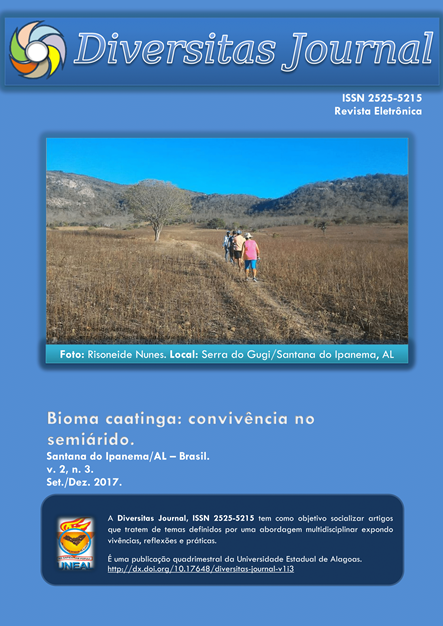
Caatinga biome: coexistence in the semi-arid region
Vol. 2 No. 3 (2017)We present to the Brazilian and global scientific community volume 2, number 3, of 2017 of the Diversitas Journal, published by the State University of Alagoas (ISSN 25255215), with the theme Caatinga Biome: Living in the Semi-Arid Region. This edition highlights the uniqueness of the Caatinga biome, one of Brazil's richest and most challenging ecosystems, and explores sustainable living strategies in the semi-arid region, promoting the appreciation of the area's natural and cultural resources.
The articles in this edition address topics such as biodiversity conservation, the sustainable use of natural resources, and the traditional practices of local communities. Additionally, case studies are presented to illustrate how science can contribute to sustainable development and improve the quality of life in the semi-arid region while respecting the specificities of the Caatinga biome.
With an interdisciplinary approach, this edition of the Diversitas Journal invites readers to reflect on the importance of integrating scientific knowledge and traditional wisdom to tackle the environmental and social challenges of the semi-arid region. It is essential reading for researchers, policymakers, and anyone committed to sustainability and the preservation of the Caatinga biome.
-

Science on the move in all territories
Vol. 2 No. 2 (2017)Once again, we present to the global community volume 2, number 2, of 2017 of the Diversitas Journal, published by the State University of Alagoas (ISSN 25255215), with the theme Science in Motion Across All Territories. This edition celebrates the ability of science to transcend borders and connect different territories, promoting sustainable development and social inclusion. The articles explore how science can act as a driving force for transformation, integrating local and global knowledge.
The texts in this edition address scientific initiatives that directly impact communities in various regions, highlighting the importance of interdisciplinarity and collaboration among researchers, institutions, and civil society. Additionally, case studies are presented to illustrate how science can be applied to solve specific challenges, fostering innovation and progress.
With a reflective and practical approach, this edition of the Diversitas Journal invites readers to consider the role of science as a tool for building a more balanced and sustainable future. It is essential reading for researchers, educators, and all those committed to scientific and social advancement.
-

Rural education: identity and cultural formation.
Vol. 2 No. 1 (2017)With great seriousness and attention to global scientists, we present volume 2, number 1, of 2017 of the Diversitas Journal, published by the State University of Alagoas (ISSN 25255215), with the theme Rural Education: Identity and Cultural Formation. This edition highlights the relevance of rural education as an essential tool for valuing cultural identities and strengthening rural communities. The articles explore how education can be a powerful tool to promote social inclusion and preserve local traditions.
The texts in this edition address pedagogical practices that respect cultural diversity and promote the formation of conscious and engaged citizens. Additionally, case studies are presented to illustrate how rural education can be adapted to the specific needs of each community, contributing to sustainable development and the construction of a more equitable society.
The publication also emphasizes the importance of integrating traditional and academic knowledge, creating an enriching dialogue between different perspectives. This interdisciplinary approach is fundamental to addressing the challenges faced by rural communities and promoting the appreciation of their cultural identities.
The articles further highlight the role of educators as agents of transformation, capable of inspiring positive changes and strengthening the bonds between individuals and their communities. Identity and cultural formation are presented as central elements for building a more inclusive and sustainable future.
With a reflective and practical approach, this edition of the Diversitas Journal invites readers to rethink the role of education in preserving cultural identities and promoting rural development. It is essential reading for educators, researchers, and all those committed to valuing rural communities.
Finally, this edition reaffirms the commitment of the Diversitas Journal to fostering relevant and timely debates, contributing to the advancement of science and the construction of a more just and inclusive society.
-

Teaching and practice: maintaining quality is the challenge
Vol. 1 No. 3 (2016)We present another edition of the Diversitas Journal, this time volume 1, number 3, of 2016, published by the State University of Alagoas (ISSN 25255215), with the theme Teaching and Practice: Maintaining Quality is the Challenge. This edition addresses the challenges faced by educators and institutions in the pursuit of excellence in teaching, highlighting the importance of innovative pedagogical practices and continuous training strategies.
The articles in this edition explore how the integration of theory and practice can contribute to improving the quality of teaching, promoting more meaningful learning aligned with contemporary demands. Additionally, case studies are presented to illustrate successful initiatives in the educational field, showcasing the positive impact of collaborative and interdisciplinary approaches.
The publication also emphasizes the need to invest in the training of educators, ensuring they are prepared to tackle the challenges of a constantly changing world. The quality of teaching is presented as a central element for social and economic development, reinforcing the role of education as a driver of progress.
With a reflective and practical approach, this edition of the Diversitas Journal invites readers to rethink the role of education in building a more inclusive and sustainable future. It is essential reading for educators, policymakers, and all those committed to improving the quality of teaching.
-
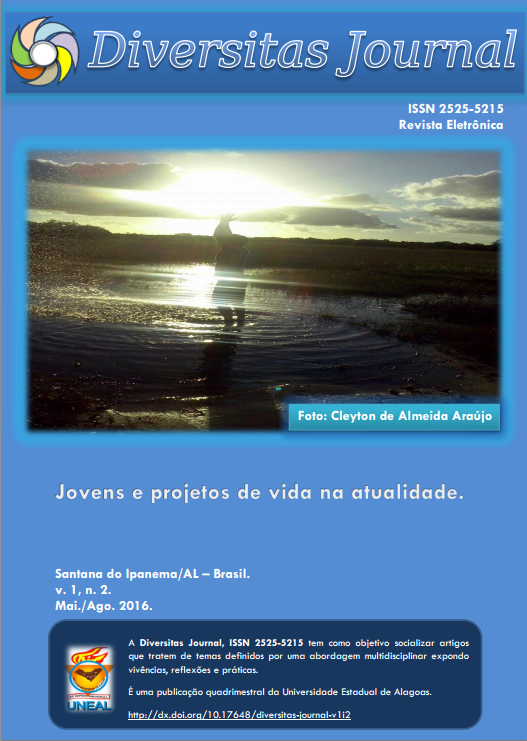
Young people and life projects today
Vol. 1 No. 2 (2016)We remain steadfast in our mission to disseminate Science with volume 1, number 2, of 2016 of the Diversitas Journal, published by the State University of Alagoas (ISSN 25255215), with the theme Youth and Life Projects in Contemporary Times. This edition addresses the challenges and opportunities faced by young people in building their life projects in a constantly changing world. The articles explore how social, cultural, and economic factors influence the choices and paths taken by new generations.
The texts in this edition highlight the importance of providing educational and emotional support to young people, helping them develop skills and competencies to prepare for future challenges. Additionally, case studies are presented to illustrate how different contexts can impact life projects, from rural communities to large urban centers.
The publication also emphasizes the need for public policies that promote inclusion and equity, ensuring that all young people have access to the opportunities necessary to achieve their dreams and contribute to societal development. Interdisciplinarity is highlighted as an essential element to understand the complexity of issues surrounding youth life projects.
With a reflective and practical approach, this edition of the Diversitas Journal invites readers to rethink society's role in building a more inclusive and sustainable future for new generations. It is essential reading for educators, researchers, and all those committed to the well-being and development of young people.
-

Educate and research: reflecting on academic training
Vol. 1 No. 1 (2016)We inaugurate with this first issue of volume one a grand new project for the dissemination of science in Brazil and around the world, the Diversitas Journal, with the theme Educating and Researching: Reflecting on Academic Formation. This inaugural edition celebrates the importance of academic reflection as a critical component of both education and research, promoting an in-depth analysis of learning experiences and the integration of theoretical knowledge with practical application.
Reflecting on academic formation is a process that encourages the development of a personal perspective, allowing individuals to connect their unique experiences to broader knowledge bases. This practice not only facilitates the assimilation of new information but also cultivates critical thinking and analytical skills, which are indispensable in an ever-evolving academic world.
The articles in this edition highlight how academic reflection can support lifelong learning, fostering adaptability and resilience in the face of complex challenges. Additionally, studies are presented that illustrate how reflective practice can enrich both teaching and research, creating a virtuous cycle of personal and professional growth.
Another point addressed is the appreciation of diverse perspectives, recognizing that understanding is often incomplete and situations are rarely absolute. This approach encourages dialogue and collaboration, fundamental elements for advancing knowledge and building innovative solutions.
The publication also emphasizes the importance of integrating academic reflection into the daily lives of students and professionals, highlighting its role in shaping critical and engaged citizens. This practice is presented as a powerful tool for addressing contemporary challenges and contributing to sustainable development.
With an interdisciplinary approach, this edition of the Diversitas Journal invites readers to rethink the role of education and research in society, promoting a more holistic and integrated view of knowledge. It is essential reading for educators, researchers, and all those committed to academic excellence.
Finally, we reaffirm the commitment of the Diversitas Journal to fostering relevant and timely debates, contributing to the advancement of science and the construction of a more just and inclusive society. This first issue marks the beginning of a promising journey in scientific dissemination, uniting education and research for collective progress.













